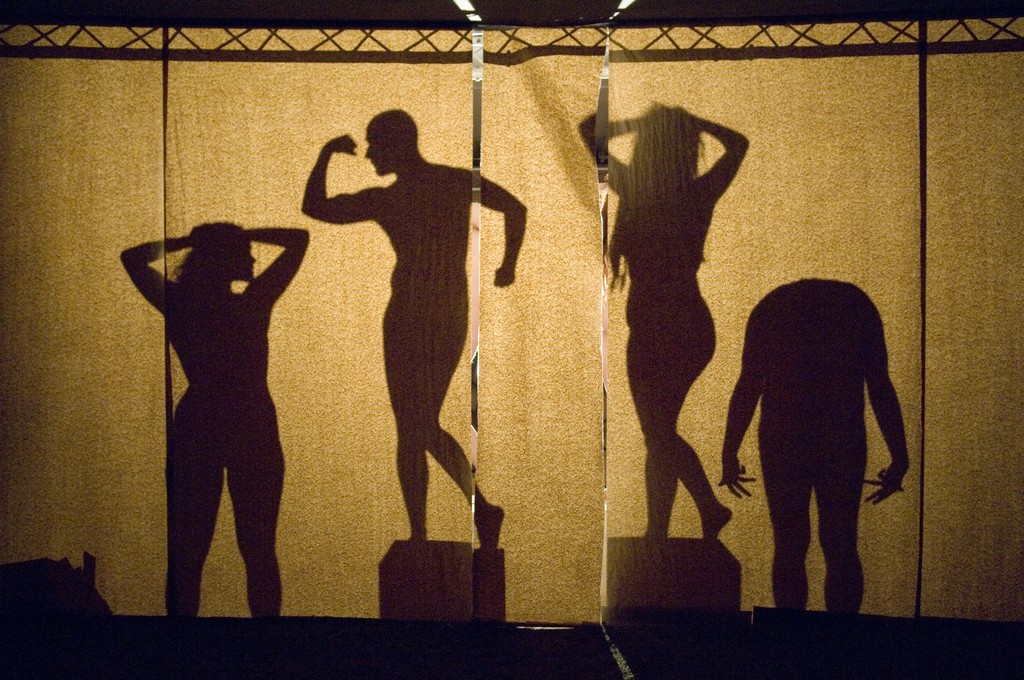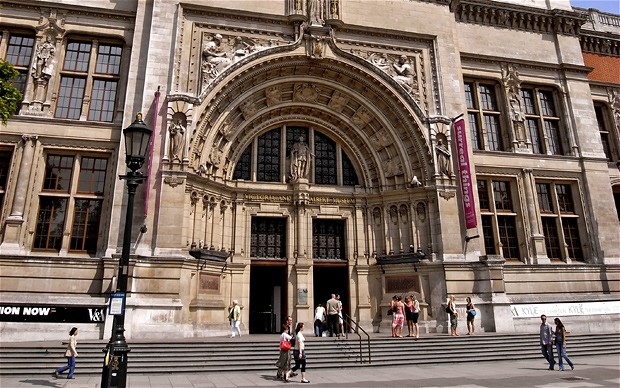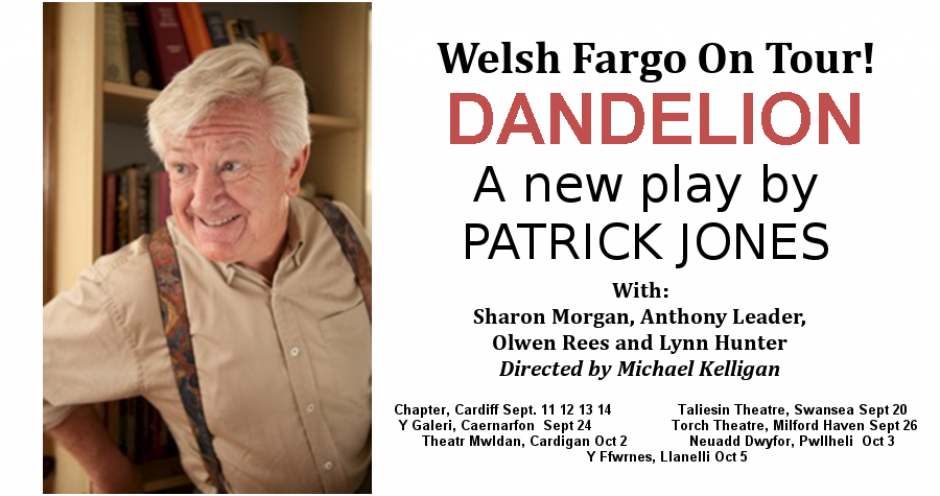
This was the first play to make me cry. Not because it was so awful, of course; but because its story, characters and premise would bring tears to even the most cynical of eyes. In fact, the work of Patrick Jones has always been intensely emotional. His poetry is especially controversial and visceral, tackling subjects as taboo as male sufferers of domestic violence. Even the most fearless of playwrights, Harold Pinter, called his work “very strong stuff.” In November 2008, bookselling giant Waterstones cancelled an appearance from Jones at one of their stores after a pious religious group protested outside due to alleged blasphemy.
However, in Dandelion, Jones considers a gentler yet equally anguished subject – old age. Four characters – three women and one man – recount their lives through a crescendo of remember-whens slumped in armchairs awaiting imminent death. Written from actual encounters when Jones served as writer-in-residence at a hospice, this makes the stories in Dandelion all the more distressing. Death has now become a comfort to these dwindling flames; something to look forward to as the days drag on. They are the dandelions withering away in a garden already blossoming new life. It’s a truly heartbreaking premise, made even more so by the intermittent poetic monologues, showcasing Patrick Jones’ scintillating talent for poignant lyricism. Alongside the grief are some outright hilarious scenes played with as much adroitness and dexterity as the more sombre moments.
The acting is simply exceptional. Anthony Leader plays Ernest with the vitality and energy of a young boy, determined to show that his age isn’t getting him down. Sharon Morgan’s deeply moving portrayal of Rachel puts on a brave face despite the inner turmoil brought on by her tragic past. Olwen Rees wrenches the heart strings as Mary, playing her with wide-eyed innocence, and Lynn Hunter gets the audience cackling with her sour, acerbic comments.
The writing, the lighting, the acting, the set – it’s, quite frankly, flawless. It is rare that a play produces as much tears from laughter as it does from grief. As hackneyed a phrase as this may be: this play will make you live a better life. It’s a drama of universal empathy that beats any amount of dreary soap operas. Get off your settee and bag yourself a ticket before you end up like them.
Dandelion is at Taliesin Arts Centre, Swansea on September 20; Y Galeri, Caernarfon on September 24; Torch Theatre, Milford Haven on September 26; Theatr Mwldan, Cardigan on October 2; Neuadd Dwyfor, Pwllheli on October 3 and Y Ffwrnes, Llanelli on October 5.
Category Archives: Theatre
‘One Thousand Pages in Two Hours’ Review Lion Boy, Wales Millennium Centre by Young Critic Katie Treharne
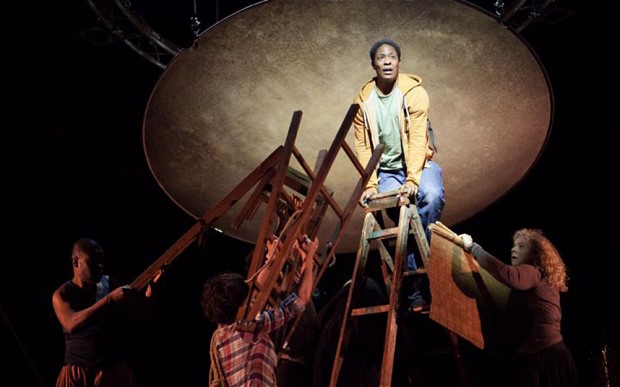
One Thousand Pages in Two Hours
Lionboy
Complicite
Wales Millennium Centre
06/07/2013
From entertaining children with the written word to entertaining children on the stage, Complicite’s production of the bestselling trilogy Lionboy has pulled out all the stops to live up to the books’ high standards. The production, which follows the plight of 11 year old Charlie Ashanti (Adetomiwa Edun) as he races to rescue his abducted parents, stars a simple but talented eight-man cast. Of course, it isn’t the thought-provoking idea of the small Charlie chasing down the abductor, the evil pharmaceutical giant, The Corporacy, which appeals most to the children, but his fantastical power to communicate with cats.
With just a flying disk and movable lighting bars in terms of set, the pressure is all on the actors to bring the tale to life. Each actor speaks and moves with individuality, so much so that at times it is difficult to keep your eyes on one person. The audience is left astounded by a section of awe-inspiring gymnastics on a suspended hoop by the young Lisa Kerr (who plays a variety of roles in the production.) Also particularity admirable is acute use of cat mannerisms which allow Adetomiwa Edun to make quick transitions from animal form to human form naturally and effectively. With no props to aid him, Edun manages to move believingly from the adventurous young Charlie to a hostile lion in just a leap, twirl and feline arm movement. The superb acting leaves little effort for the imagination.
African style instruments accompany the show, played live by a single musician. The particular use of the styled instruments is perfect for the setting of the tale, which mostly takes place in Africa. In addition to this, the actors’ own voices are atmospheric and blend well together to create tension in the most hair-rising sections of the play. No corny solos ruin the ambience.
One of the most difficult aspects of children entertainment is the children’s short attention span. However, the strategically placed twenty minute interval fifty minutes into the show provides a perfect opportunity for the younger ones to refresh, and during the show the use of visual creations such as a lion face created by the shadow of three people does not fail to keep the audience’s eyes on the stage. Similarly to The Britain’s Got Talent 2013 winner, Attraction, who shadow danced their way to the throne, this creative form of entertainment has proved itself to be a big winner with the general public.
Although the interaction with the audience throughout the play also makes the performance more interesting, the cheesy ten to fifteen minute boxing match at the end of the show is a big let-down, in my opinion. The match, which is between The Corporacy and Charlie, requires the audience to cheer for their preferred side, turning the production into a cheap pantomime, which brings the professionalism of the show down a notch. The boxing match, which is obviously intended to be an interesting way to get across the positives and negatives of The Corporacy’s controversial methods of finding the cure for asthma, is overly cheesy and drags on. I personally feel that the actors are a little too reliant on the audience’s responses rather than their own acting skills.
Ultimately, I would recommend Lionboy to anyone looking for an entertaining evening. With enough visual effects to keep children’s attention and plenty of thought-provoking ideas and superb acting to keep adults and teens more than satisfied, it’s sure to provide a spectacular show. Although the cheesiness of the boxing match drags down the overall standard of the show, Lionboy is worth a trip to your nearest theatre.
Reviews Flights of Fancy, Park and Dare Theatre by Bridgend Youth Dance Young Critics.
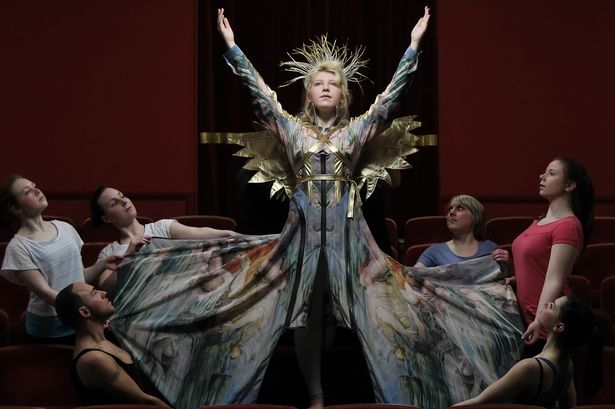
Earlier this year members of Bridgend Youth Dance whom are interested in the field of dance criticism went to see and review Flights of Fancy at the Park and Dare theatre, Treorchy, please find their reviews below.
Review Flights Of Fancy by Anna Whistance, Bridgend Youth Dance Young Critic
Aged 13
I attended the Flights Of Fancy production with fellow members of Bridgend Youth Dance at the Park and Dare Theatre,RCT. The first thing I would like to say is I thought the costumes were fantastic they really gave the effect of a representation of Wales on stage with the bold use of red. I was also struck by the energy of all of the dancers and singers on stage, they were great.
The Flights Of Fancy production used the idea of music and dance throughout the years showing milestones in the areas history this was great and the wonderful use of the building really made the production come alive.
The lighting created some amazing effects on the scenes shown on stage and I loved the glow in the dark costumes!
The only thing I think that could improve the production was some of the timings for the dancers.
Overall I thought the show was very well put together, the energy on stage was electric with giant smiles from the audience !
I would like to say well done to everyone involved in the production and as a young dancer I personally loved Flights of Fancy.
Review Flights Of Fancy by Bronty Freeman, Bridgend Youth Dance Young Critic
Aged 13
Flights of Fancy is a production, which was performed at the Park and Dare Theatre in Treorchy, RCT. The show consists of a variety of singers and dancers, varying in age groups, as they tell the story of the theatre throughout the years.
They production made amazing use of the venue, as the audience were seated on the stage and the performers stage was the theatre seating areas. The costumes were very creative, as was the choreography and the performers made good use of the props.
There was a range of old and modern music and the orchestra played very well. The dancers were very energetic and they were all smiling and looked like they were having a good time, which made you feel happy. The singers ‘The Siren Sisters’ hit every note perfectly, they were very talented, and sung with enthusiasm.
There was a good use of lighting as they had a section performed with neon lights (glow in the dark). It was very creative how they had got dancers to freeze in a still image as you walked through the corridors of theatre on your way in to be seated.
Overall, I think that the show was fantastic and a great display of talent from this area.
Review by Hannah Jenkins Bridgend Youth Dance Young Critic, Age 13
Hi the production show I am reviewing is called Flights of Fancy and was performed at the Park and Dare Theatre, RCT. This show was very creative throughout. I thought there were great directing skills used in this show as it flowed easily from song to song and scene to scene.
First of all I would like to begin with the running time taken to perform the whole production, every single minute was used to illustrate moments and events of the theatres history. I also thought the choreographers did excellent jobs making the dances a perfect reflection of the history of the theatre, as before the show I didn’t actually know any of the history while after the show I knew a lot more. Another thing I liked was the choreographer’s work and how they managed to make still images and illustrations on the way to the seating area of the show, it was a clever and creative idea.
I think the age group differences were great as each performer (including dancers and singers) performed their role with a beam on their face and great use of energy. I think the use of the stage was amazing as every inch I’m sure was used to perform a dance or act! All the costumes were well thought out, made and designed each outfit fitted the story of each scene!
I particularly liked how the lighting crew and costume team put their heads together to make a neon scene, which represented the Doctor Who filming in the theatre! I think I should give credits to the singers The Siren Sisters as they had to remember quite a few songs but they each sang their hearts out!
I think this show is suitable for all ages! It’s well worth seeing the enthusiasm and smiles of all those involved in the production. I would like to thank them for putting on such a great worthwhile show! If the team involved wanted a target for future performances it would be to keep up the energetic and creative work!
Review Blinda, Chapter Arts Centre, by YC Chelsey Gillard. Naked people, Hugs and Pure Darkness!?
Review Diary of a Madman, Living Pictures, Sherman Cymru, YC Chelsey Gillard.
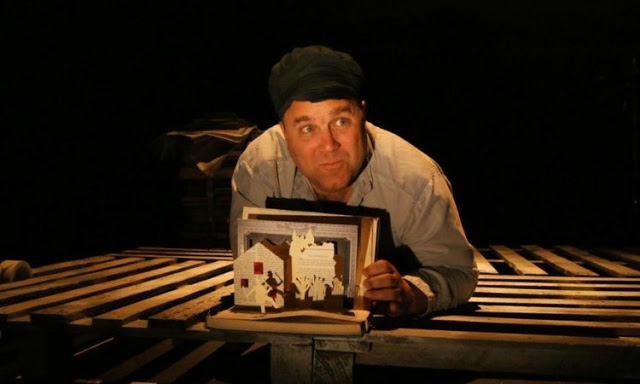
Living Pictures have proved that all you need to make great theatre is an intriguing story, a team with great attention to detail and one actor with awe-inspiring charisma.
|
13 June, 7.45pm
|
Taliesin Arts Centre
|
01792 602 060
|
|
|
18 June, 7.30pm
|
Galeri, Caernarfon
|
01286 685 250
|
|
|
05-06 July, 8.15pm
|
Tobacco Factory, Bristol
|
0117 902 0344
|
|
|
10 July, 7.30pm
|
Y Ffwrnes, Llanelli
|
0845 226 3510
|
|
|
03-25 August, 4pm
|
Venue 13, Edinburgh Festival Fringe
|
07075 161 620
|
Review,Say It With Flowers,Sherman Cymru, Elin Williams
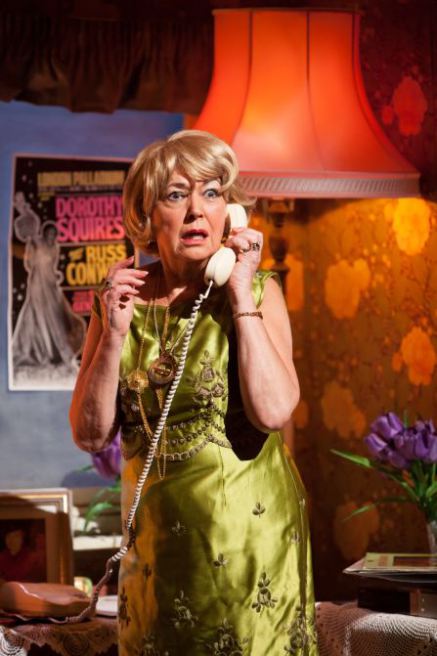
Nobody embodied the concept of rags to riches better than Dorothy Squires. Born in a carnival caravan in Pontyberem near Llanelli, Squires packed in her job at the tin factory, and set out on the ultimate gold paved path to The Big Smoke. There, after years of tireless performances in the West End, she rose to unimaginable fame, and soon after became the highest paid singer in the UK. Although her story is most certainly rags to riches, it is also the perfect example of a rise and fall too. After numerous court cases, Squires found herself broke and back in Wales, housed by a devoted fan in the Rhondda valley Trebanog. From her marriage to Roger Moore to her dependency on amphetamines, Squires’ offstage life was perhaps more dramatic than her performances onstage, and so it was only a matter of time until her life became the focus of the contemporary stage.
The play, named after one of Dorothy’s songs, is a collaborative project between notable Welsh playwright Meic Povey and personal friend of Squires, the writer Johnny Tudor. The script provides a rather well-rounded representation of Squires’ life, but unfortunately it is peppered with numerous clichés and clumsy stumbles into past flashback scenes. The performance is divided into past and present, eventually coming together in a chaotic climax before Squires is carted off to hospital.
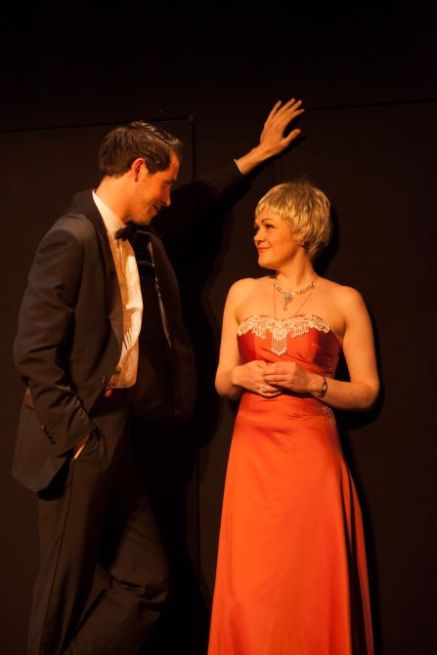
Ruth Madoc plays a stock-type celebrity, although she really begins to thrive during the more dramatic scenes in which Dorothy is falling apart, hallucinations driving her to near madness. Gillian Kirkpatrick is absolutely phenomenal as a younger Squires, not only a fantastic singer and performer, but a truly believable and impressive actress. Lynn Hunter as devoted fan Maisie provides the comic relief, with natural flair for comedy. The script is both funny and original in parts, but it is let down by endless Tory gags, somewhat easy for an assumedly left-wing audience. The frequent swearing, although provoking shocked, cathartic laughs from the audience, really is excessive; the over use of one specific word (beginning with c and rhyming with runt) becomes meaningless and lazy.
The smooth interweaving of music into the piece really gives the script a well-needed boost. Similarly, the odd Welsh language phrase creeps in, serving as a reminder of Dorothy’s rejection of her Welsh identity. This, being such an interesting and relevant theme, certainly could have been developed more. The stage is divided into two diagonal halves, one side a grotty 90′s valley living room, the other a completely black and underused space. The piece does contain a wonderfully creative scene change. Intruding on Dorothy when she is at her most vulnerable, paramedics and policemen come in and strip the walls bear in a frantic display representative of Dorothy’s confusion. The stage is then moved deeper, and is transformed into the clinical confines of a hospital.
Certain aspects of the script really pulled the story back into the harsh light of reality. The reveal of Dorothy’s catheter bag as she tries to seduce an imagined young Roger Moore is really quite poignant and upsetting, but it seems to be misinterpreted by the majority of the audience who laugh at its grotesqueness. This particular example seems to indicate that the script really could have taken the whole thing in another direction, but it never arrived there; the laughs just kept coming.
The story was certainly worthy of stage adaptation, but the script seemed confused somehow. The whole production needed to go that few steps further; more character development certainly would have improved this. It has to be said however that the audience certainly enjoyed the piece; a standing ovation signalled the general feeling of enjoyment. Singing performances were the strength of the production, and after all, that is arguably the main point of representation; Dorothy Squires was above all an iconic Welsh songstress.
Review Salt, Root and Roe, Theatre Clwyd Cymru, Sherman Cymru, Chelsey Gillard
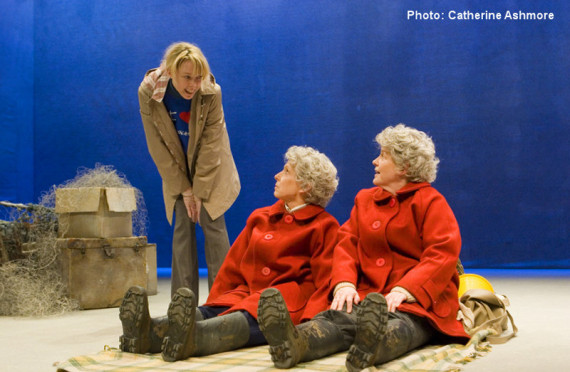
Salt, Root and Roe
Theatr Clwyd Cymru
Sherman Cymru, Theatre 2
8th May 2013
The run down house of elderly twin sisters Anest and Iola seems to rise up out of the sea and if the stories are to be believed they themselves were found in a lobster pot by their father who was half merman!
This feeling of Welsh fairytale runs deep through Tim Price’s beautifully written play and it gives the sense that the twins are somewhat ethereal and otherworldly. Indeed we soon find out that they do not have long left in this world, having decided to take their own lives to release themselves from the torture of Iola’s ever-worsening dementia.
Early moments did (for me) feel somewhat melodramatic but soon a beautifully directed rhythm of highs and lows really captured the sense of Iola’s good days and bad days. Sara Harris-Davies sensitively and convincingly played Iola, skilfully navigating both the tender and the violent aspects of the septuagenarian’s illness. Combined with the tender love pouring out of Betsan Llwyd’s Anest the pair were genuinely heartbreaking and certainly had the audience in tears on more than one occasion.
One of the only things keeping the pair alive is their tie to Anest’s daughter Menna (Catrin Aaron) who rushes to their Pembrokeshire home as soon as she receives a letter from Iola telling her niece that she plans to kill herself. Tragic Menna already has a lot to deal with; she seems to suffer with crippling obsessive compulsive disorder centred on a fear of germs. Her desperation to rekindle her Welsh origins and reignite the older women’s passion for life whilst dealing with her own demons was moving and made an initially cold woman human and relatable.
It wasn’t all doom and gloom; whenever caring local policeman and family friend Gareth (Brendan Charleson) entered he seemed to bring a ball of positive energy with him despite having his own problems at home. His chemistry with Menna was wonderful to watch as the two slowly grew more comfortable in each other’s company.
In what is already a charmingly slow-burning play unnecessarily slow furniture changes sucked any pace from proceedings. Although this suited the gentle nature of the dialogue it was frustrating when the stage was left empty with only off-stage murmurings to keep you engaged.
Having said that, the words and the acting were so expertly crafted that the production did not once lose the audience’s attention. It was refreshing to see a contemporary play that dealt head-on with one of the most controversial topics of healthcare today. Not only did it provide a heartbreakingly honest portrayal of old age but it also had an obvious and well reasoned pro-euthanasia stance without being pushy or overtly political. Here were two old women who could be any Welsh Mamgu trying their best to come to terms with human frailty.
Photo Catherine Ashmore.
Review Spangled, Mercury Theater Wales,Chapter Arts Centre, Chelsey Gillard.
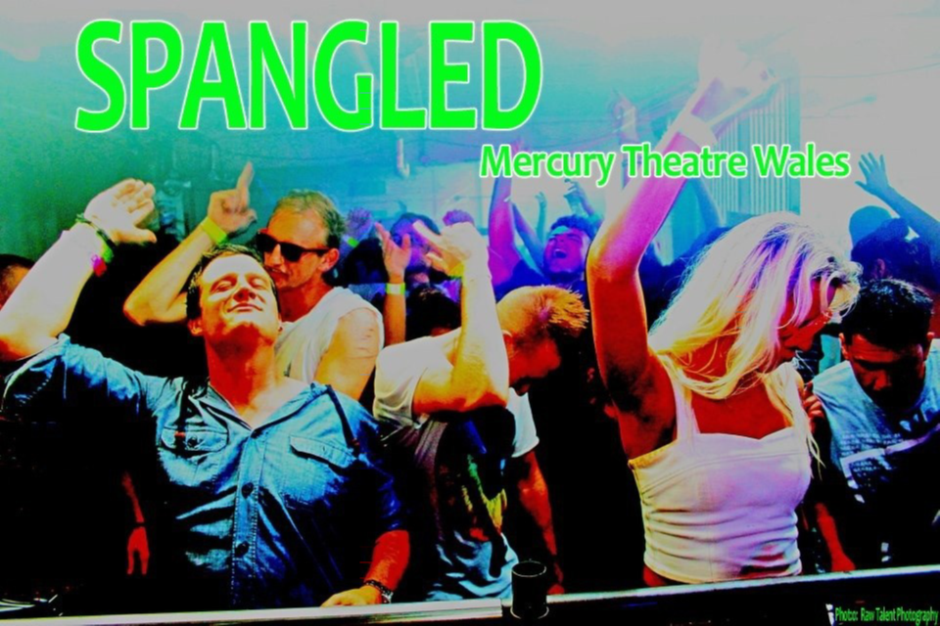
Bumbags, Curtain-cuts and Ecstasy!
Spangled
Mercury Theatre Wales
Chapter Arts Theatre
2nd May 2013
Bum-bags, curtain-cuts and ecstasy, add in a hypnotic rave track and you have the perfect ingredients for a night out in 1993!
Mercury Theatre completely transformed the theatre in Chapter, removing the seating and replacing it with a bar, DJ booth, a seated “chill-out zone” and dance platforms. The black walls, laser projections, film clips of clubbers and heavy soundtrack really made it feel as though we had been let into a top night spot.
The bouncer on the door frisked some of the men, while the rest of us had a smiley face stamped on our hands and were given neon glosticks to get us in the mood to party. It was surprising how easy it was to be caught up by the music (not at all to my taste!) and soon most people were at least bobbing their heads in time to the beats, some were really going for it and could have fit in nicely with the cast.
Up on the platform beautiful and innocent Angel (Sian Davies) lets the music control her body as she writhes seductively unaware of the attention she is attracting. She has certainly caught Gary’s (Rhy Downing) eye – he looks on longingly, after trying to convince his mate Sean (Jason Marc-Williams) to take some “painkillers” to help his headache. Sean is there to see his girlfriend Donna (Holly Fry) , they live the typical Welsh valley’s life – get a job and settle down young, but is this enough for DJ wannabe Donna?
The inspiration for Donna’s goal comes in the form of DJ Johnny (Lee Mengo) who started out with a passion for music but somewhere along the way he got distracted by the women and the drugs. Linking all these characters together is Angel’s mother’s boyfriend – Steve (Jason May) a businessman proudly showing off the latest in technology – his huge mobile phone. He is also a casual drug dealer who just can’t stop using himself.
There was just enough narrative cleverly woven into the quieter moments of music but unfortunately quite a lot was lost due to microphone volume (possibly intentional, but seemed like an error). Cleverly choreographed movement scenes were slick and impressive, really expressing the feelings of euphoria that this kind of club culture is associated with.
Having seen this as a work in progress as part of the Wales Millennium Centre’s Incubator scheme I was pleased to see how much the work has come on. New video art by Holly Genevieve and music by renowned DJ Jimpy really enhanced the authentic club feel. On the other hand the dialogue and characters were still somewhat clichéd and certain plot points – a sudden (drug related?) collapse – were never fully explained or explored. Having said that more dialogue would have weighed down the fast pace and disturbed the immersive nature of the production.
The cast were excellent, not to mention unbelievably fit, to keep up that level of energy and give believable performances is no easy task. Special mention must go to Lee Mengo as DJ Johnny who bought an easy going, natural charm to his performance and Jason May as slightly past it Steve. As the oldest member of the cast Jason gave the most heartbreaking and convincing performance as a man trapped by his own addictions and fears, he was completely believable as a real hardcore clubber who doesn’t know when it’s time to just go home.
This really is a company to keep your eye on, here they have created a truly original and innovative piece of work that is sure to leave the audience with a smile on their face and a sudden desire to don their best shell suit and hit an underground rave.
The tour continues:
8th May – Aberystwyth Arts Centre
15-18th May – Volcano @229 High Street, Swansea
23rd May – The Riverfront, Newport
25th May – Theatr Soar, Merthyr Tydfil
For more on Mercury Theatre Wales –
Facebook: www.facebook.com/MercuryTheatreWales
Twitter: @MercuryTheatre1
For more reviews : www.HyperCriticReviews.blogspot.com
Article, Critics are Parasites
‘Critics are Parasites’
Meet the Critics at the V&A organised by the Critics Circle 27/04/13
I coordinate the activities of the Young Critics, the new 3rd Age Critics group and helped set up the inaugural Theatre Critics of Wales Awards at Sherman Cymru earlier this year. I read with interest that the Critics Circle was organising a free event for anyone interested in a critical understanding of the arts and went along to learn more.
The morning session was chaired by Paul Gambaccini and comprised of a series of five panels consisting of three critics, one panel from each Critics Circle section, Drama, Music, Film, Dance and Visual Arts, the panellists talked about their relevant fields and answered questions. Critics present included Michael Billington, Mark Shenton, Jason Solomons, Barry Norman, Marine Vaizey, Claire Allfree, Jeffery Taylor, Libby Purves, Fiona Mountford, Richard Morrison, Guy Dammann, Erica Jeal, Sanjoy Roy, Donald Hutera, Simon Tait, Hugh Pearman and Sarah Crompton.
The morning session consisted of the different critic’s panels discussing their entry routes into the world of arts criticism, this being most frequently that of the journalist.
There were some interesting and provocative statements relating to the critical process with Barry Normans definition of the critic as ‘parasites’ appearing to resonate most strongly in the room.
Other statements included,
- The critic must be honest to the audience.
- Don’t bore the reader.
- The opinion of the star struck critic is worthless.
- Don’t be in awe of someone who earns their living from pretending to be someone else.
- Critics shouldn’t be populist celebrities it’s a form in its own right.
- Someone over 40 with considerable life experience and knowledge of their form is a better critic than that of a young person.
- Be brave, failure is good.
- Nobody wants to make bad work.
- A review can be better if the critic understands the artist’s intention.
- Good writing is rewriting.
- The critic provides the match report.
- Make the reader know what it was like to be there.
- The critic is a professional member of the audience.
- Without critics we risk the sound of one hand clapping.
- The best critics are practioners, but not the best reviewers.
The second half of the session was chaired by Mariella Frostrup and devoted to the future of the critic and their trade. Topics for discussion included what might happen to criticism in the age of the blogger, the impact on the critic’s trade and the standards of the on-line amateur with opinions but no qualifications for holding opinions, the tweeter who tweets without thought, and of people who have no experience of life.
I felt this afternoon session focused primarily on many of the negative elements of the internet and the changes currently taking place in the world of arts criticism.
It was immediately apparent that the process of change currently taking place for many arts journalists is a very difficult process but I felt that many of the positive aspects of the internet were overlooked. This also seemed to relate to the opinion of some of the panellists and the Critics Circle themselves, they seemed to think that for a critic to have a worthwhile opinion they need to have considerable life experience and to have an in-depth knowledge of their subject matter. Whilst I am sure this is true to an extent I feel this risks alienating a huge sector of new potential critic’s especially younger ones.
In my opinion the positive developments of ‘everyone is a critic’ alongside the internet has allowed a more inclusive voice to be heard regarding many art forms. There are a range of audiences/ages for much of the work created and I don’t feel its representative to only focus on the voices of older predominately male critics.
I feel that projects such as Young Critics, 3rd Age Critics, Wales Arts Review and magazine websites such as A Younger Theatre help to support a more honest, inclusive critical voice as opposed to the Critics Circle ideal critic
‘Which is not to say critics should be dinosaurs just that they should have lived a little.’
With these thoughts in mind the Young Critics have arranged the event below to continue the discussions in Wales
‘Response’
A series of critical conversations The Wales Millennium Centre, Cardiff, Sat the 7th of Sep 10-4 pm.
Subjects for discussion at Response may include
- Venue/producers presentation, an open forum to discuss the relationship with Arts Critics, venues, producers and artists.
- Lack of critical commentary in an area, and what can be done/is being done to support work.
- Looking beyond the traditional routes for criticism, how can engagement go further?
- Producing venues from across Wales will be invited to attend these days to showcase their work and invite a critical response (this will be cross art form).
- The notion of the “professional” critic in the age of blogging; a discussion with arts practitioners about the kinds of criticism (if any) which they find useful.
- Arts Criticism in the Welsh Language (With a focus on work for younger audiences).
- The future role of the Arts Critic.
If you have any suggestions for discussion topics or would like to present at Response please let me know.
Critic’s Circle article on their event.
http://www.criticscircle.org.uk/Default.asp?ID=330&PID=1
Review Love & Money, Waking Exploits, Chapter Arts by Sarah Finch.
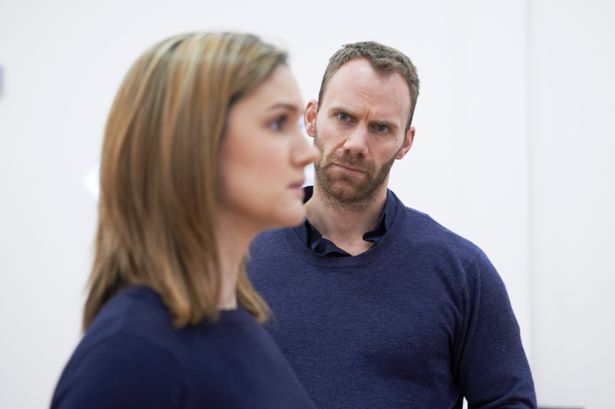
On Thursday 18th of April I attended Chapter Arts Center in Canton, Cardiff to view the production Love and Money.
Love and Money tells the story of relationships, heartache, sacrifice, obsession and money within the marriage of a young couple, David and Jess. Written by Dennis Kelly, we follow a young woman’s all too familiar addiction for material items with an expensive taste and the severe consequences that follow.
Love and money takes the audience on a roller coaster of emotions as we see the destruction caused by Jess’ craving to spend money, her husband David’s plummet into desperation trying to fix the overwhelming debt that has been caused and the eventual demise of the relationship.
The playwright cleverly uses scenarios such as online romance and favours from friends to gain empathy from the audience, the situations become relatable and we begin to question ourselves if we would also behave and react in the same way in which the characters do.
Whilst initially shocked at the predicaments our characters had to face I then began to wonder, what would I have done? Would I take the job? Would I have called the ambulance or would I have taken David’s route and helped Jess to end it all? It certainly left me with an internal struggle to which I’m still unsure the options I would have chosen.
Funny but tragic, Love and Money is thought provoking and leaves us with the idea of can money truly buy happiness? Or does it leave you with a broken heart, an empty bank account and a relationship with no trust.

